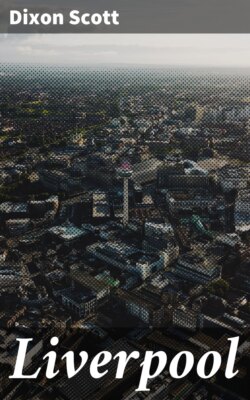Читать книгу Liverpool - Dixon Scott - Страница 4
На сайте Литреса книга снята с продажи.
§ 1.
ОглавлениеTable of Contents
That fine fellow (a Scotchman, I understand) who so handsomely acknowledged the thoughtfulness displayed by Providence in “constraining the great rivers of England to run in such convenient proximity to the great towns” would have found in Liverpool-on-the-Mersey an altogether exceptional opportunity for thanksgiving. For it is upon her River, with a very singular completeness, that the existence of this great, complex, modern organism unanimously depends. Rob her of her duties as port and harbour, and she becomes impossible. Other duties, of course, she has: among the labyrinths of effort which her million people have created all about them, you will find tobacco-factories, corn-mills, soap-works, breweries, sugar-refineries, and a dozen other quite flourishing industrial exploits; but these, even if they were not in large measure directly derived from the River itself—the voice of the River, so to say, announcing itself in other dialects—are never really fundamental. They could be plucked away, as her famous Potteries were plucked away at the opening of the nineteenth century, as her Chemical Works were plucked away some decades later, without producing anything but the mildest and most parochial of disturbances. Certainly, there would be no crisis: the great machine would still throb equably, the procession of her continually advancing life would still move magnificently on. But if you rob her of her river-born attributes, you leave her utterly dismantled. Let the river-estuary silt up, as river-estuaries have been known to do, as this one is constantly endeavouring to do, and the whole elaborate structure instantly crumbles and subsides. In London there are a score of Londons, in Glasgow a dozen Glasgows; but here there is only one Liverpool—Liverpool-on-the-Mersey.
That is the great fact of her life. And its significance is chief, not merely because Liverpool owes her actual existence to the River, but also because the whole quality, the “virtue,” of that existence has been determined by the completeness of the dependency. It is not simply that it is upon this broadly curving estuary, as upon some broadly curving scimitar, that Liverpool has had wholly to rely in slashing her way to the position she now maintains; it is also (and, from our present point of view, chiefly) that her fidelity to that weapon has induced certain habits of poise, of outlook, of ideal, which are now her most essential characteristics. The influence is disclosed, as we shall see, in all manner of ways. It drenches the local atmospheres, private, social, civic, with a distinctive colour. It is revealed in the nature of the men in her streets, and in the nature of the streets about the men. It is the deciding element in that inherent spirit of the place which those men and those streets at once prefigure and evoke, and which it is the main purpose of this book, with the aid of those men and streets, to attempt in some measure to enclose. Some of the channels of the influence are direct and obvious enough, others are indirect and secret; and one of the more obvious and one of the most secret are connected with the fashion in which that dependence has affected her history in the past.
